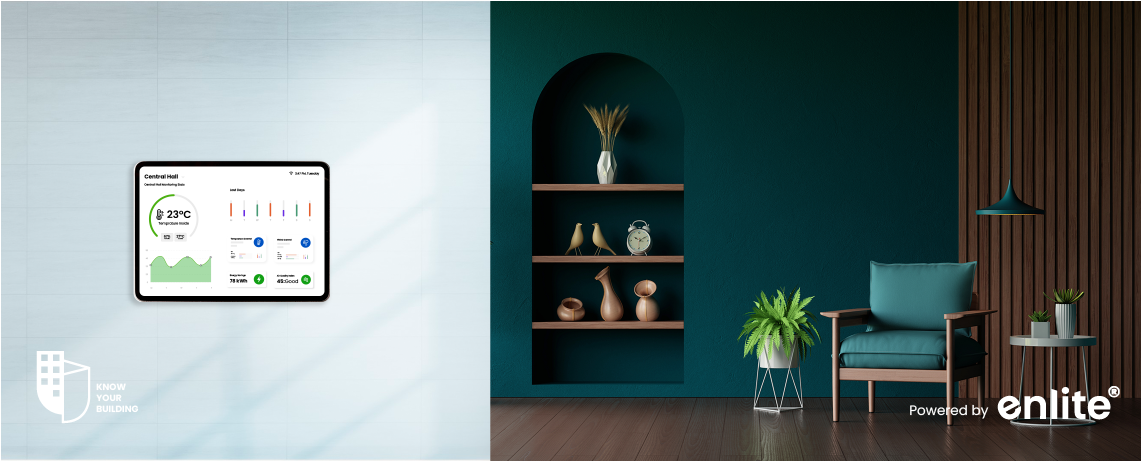In modern buildings, achieving the perfect balance between occupant comfort and energy efficiency has always been a challenge. Heating, Ventilation, and Air Conditioning (HVAC) systems account for nearly 40% of energy consumption in commercial buildings. Without intelligent management, these systems can lead to wasted energy, inflated costs, and inconsistent indoor comfort.
This is where Smart HVAC systems, powered by advanced Building Management Systems (BMS) like Know Your Building®, play a critical role. By leveraging data, automation, and real-time insights, smart HVAC solutions optimize energy use while ensuring the ideal indoor environment for occupants.
What Makes HVAC Systems “Smart”?
A traditional HVAC system operates on pre-set schedules or manual controls, often leading to inefficiencies. In contrast, Smart HVAC systems integrate advanced technologies to make dynamic decisions in real-time.
Here’s what makes HVAC systems “smart”:
- Sensors and IoT Integration: Smart sensors monitor temperature, humidity, occupancy, and air quality across different zones of a building.
- Real-Time Analytics: Data is analyzed to identify inefficiencies, predict demand, and optimize operations.
- Automation and Control: Systems automatically adjust airflow, temperature, and energy use based on real-time conditions.
- AI and Machine Learning: Algorithms continuously learn and adapt to improve HVAC performance over time.
The result is a system that balances occupant comfort with energy savings effortlessly.
Balancing Comfort and Energy Efficiency: The Science Behind It
The science of smart HVAC revolves around precision control and dynamic optimization to meet the following goals:
- Demand-Based Operation
Smart HVAC systems adapt to real-time demand by monitoring occupancy. For example:- When rooms are unoccupied, airflow and temperature settings are adjusted to save energy.
- During peak occupancy, the system ensures consistent comfort without overworking the equipment.
- Weather and Climate Adaptation
Smart HVAC systems use external weather data to predict heating or cooling needs. On cooler days, less energy is used for air conditioning, while warm weather prompts energy-efficient cooling. - Zonal Control
By dividing buildings into zones, smart HVAC systems customize temperature and airflow for each area based on its unique requirements. This prevents energy wastage in unused spaces while maintaining comfort in occupied zones. - Real-Time Monitoring and Predictive Maintenance
Smart HVAC systems detect irregularities like airflow issues or equipment inefficiencies early. Through predictive maintenance, facility managers can address problems before they escalate, reducing energy waste and preventing breakdowns. - Energy Optimization
Using advanced analytics, smart HVAC systems optimize energy consumption by:- Automating schedules based on building usage patterns.
- Reducing peak loads and unnecessary energy usage.
- Providing actionable insights to fine-tune operations.
How Know Your Building® Enhances Smart HVAC Efficiency
Know Your Building®, a wireless, cloud-native BMS, takes HVAC optimization to the next level by offering:
- Real-Time Data and Monitoring: Access live insights into HVAC performance, occupancy, and energy usage for precise adjustments.
- Predictive Insights: AI-driven predictions identify inefficiencies and schedule maintenance before issues arise.
- Remote Access: Control HVAC systems across multiple buildings from a centralized platform—anytime, anywhere.
- Dynamic Energy Savings: Automate schedules, temperature settings, and zonal controls to reduce unnecessary energy consumption.
- Sustainability Alignment: Track energy savings and carbon footprint, helping you meet ESG goals.
With Know Your Building®, facility managers can effortlessly balance comfort and energy savings while ensuring buildings remain efficient, sustainable, and future-ready.
Benefits of Smart HVAC Systems
- Reduced Energy Costs
Smart HVAC systems optimize energy use, resulting in up to 30% savings on energy bills. - Enhanced Comfort
Precision control ensures consistent temperatures, improved air quality, and healthier indoor environments for occupants. - Sustainability Compliance
By reducing energy waste, buildings contribute to lower carbon emissions and align with global sustainability standards. - Lower Maintenance Costs
Predictive maintenance prevents costly breakdowns and extends the lifespan of HVAC equipment. - Scalability
Easily scale smart HVAC solutions to manage buildings of varying sizes and complexities.
The Future of Smart HVAC Systems
As buildings continue to evolve into smarter, greener spaces, integrating advanced HVAC systems will be essential. Cloud-native solutions like Know Your Building® are paving the way for smarter infrastructure by combining data-driven insights, automation, and sustainability.
Balancing comfort and energy efficiency is no longer a challenge—it’s a reality with smart HVAC systems that work intelligently to optimize building performance.














